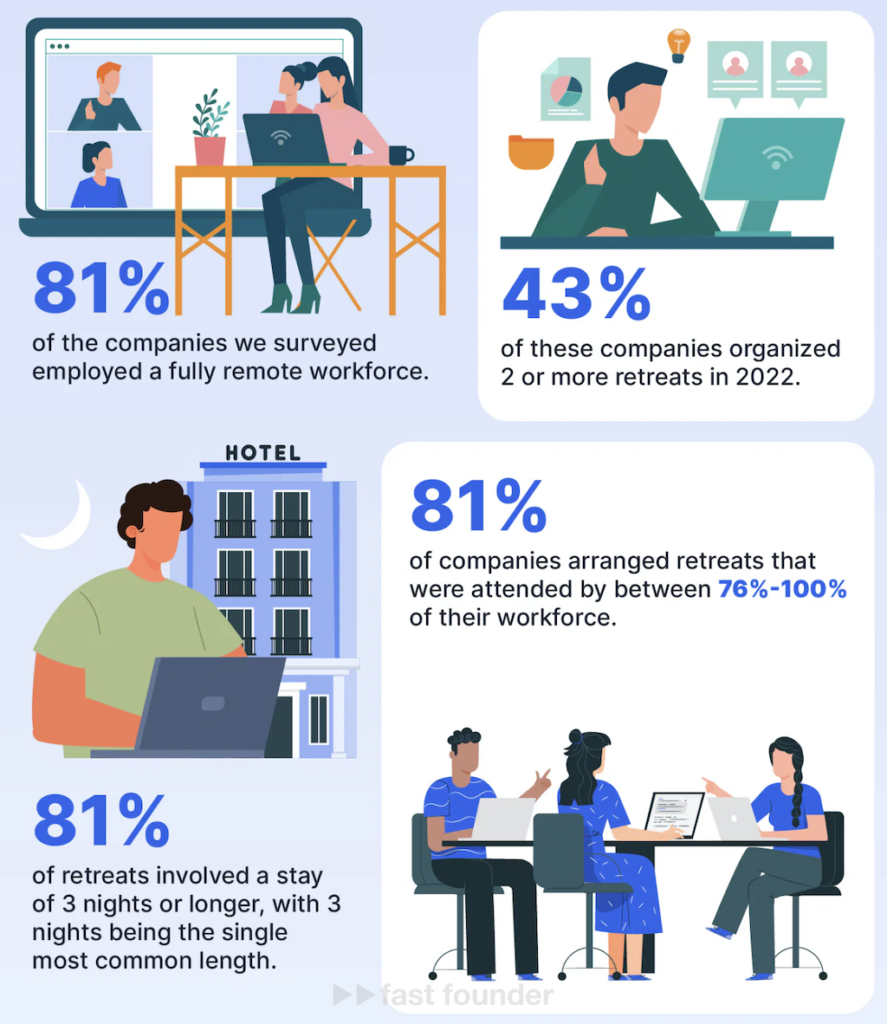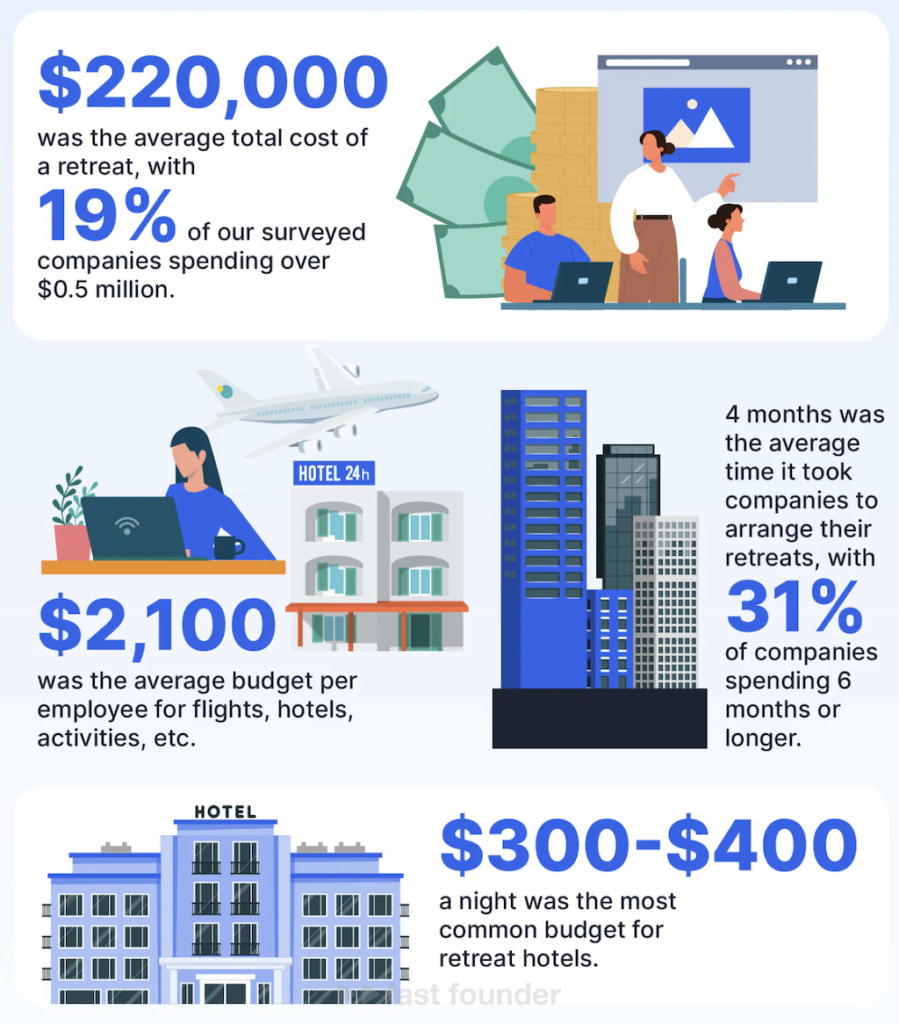The most interesting aspect of startup stories isn’t the initial ideas but the pivots! Because these are insights born from practical work within the market, not abstract reasoning from the outside. This startup ventured into organizing off-site events for remote companies.
Such events for these companies are an absolute necessity! Without them, a company could fall apart. Unlike large companies, for whom corporate events are optional entertainment 😉 However, the startup decided to make quick money.
So, it started taking orders only for large events, from the profit of which it could live for a whole month 😉 But it turned out that it couldn’t find clients for events of such magnitude every month. And then the founders decided to earn not “a lot but rarely” but “a little but often” in this way: read on
This story is interesting for two reasons. Firstly, the popularity of remote work is growing — meaning the market for off-site events for remote teams will continue to grow, and there’s still room to enter. Secondly, a similar approach can be applied in other areas.
Project Essence

TeamOut helps companies organize off-site corporate events.

With the startup’s assistance, a company can obtain all the necessary infrastructure services for such events — tickets for participants, accommodation, meals, and entertainment held during the free time from corporate meetings and seminars.

The TimeOut service is a combination of a marketplace, event planning tool, and concierge service. Ideally, all a company needs to do is inform the startup of the number of people, preferences, and event budget — then the startup provides options, from which the company selects one, after which it receives all the operational and logistical support “turnkey.”

The catalog of potential accommodation options on the TeamOut platform includes hotels and cottages, specifically selected based on their proximity to airports for quicker access and departure.

Since the startup regularly provides clients with accommodation options, organizing events through it can lead to accommodation discounts of up to 30%.

TeamOut went through Y Combinator in the winter of 2021 at the idea stage. As of today, it has been operational for less than 2 years but has already organized over 300 events based on client orders.

Among its clients are well-known names such as Accenture, Netflix, and L’Oreal.
TeamOut has raised a total of 3.2 million dollars in investments, with its last round of 2.2 million dollars taking place in the spring of 2022.

However, in December of last year, it pivoted its model — while still continuing to organize off-site events. No, I didn’t make a mistake in the date because the startup is from France, so the date format in its blog is day/month/year 😉
What’s interesting
First, let’s understand why today’s startup initially chose and still remains in the market of off-site corporate events. To do this, let’s look at the figures from another startup’s website that deals with the same topic.

81% of companies surveyed by the startup are fully remote. 43% of them held 2 or more off-site events for their employees in 2022. 81% of companies conducting off-site events took more than 75% of their employees to them. 81% of these events lasted 3 days or more, with the most common duration being exactly 3 days.

One off-site event cost the company an average of $220,000, with 19% of companies spending over $500,000 on one event. The average budget per employee participating in the event was $2,100. Of this amount, $300–$400 was spent solely on one night’s accommodation. On average, companies had to spend 4 months planning one event, although 31% of companies spent 6 months or more on this.

A post titled “Are corporate off-site events becoming an integral part of the work process?” was even published on the HubSpot blog.
The thing is, by 2025, an estimated 36.2 million Americans will be working remotely, as 26% of all working Americans were already fully remote in 2022.
In general, the corporate events market is very large. In the US alone, its size will grow to $510.9 billion by 2030. Moreover, off-site events already occupy a noticeable share of it, and with the growing popularity of remote work, this share will continue to grow.
In other words, off-site corporate events are a trend with money in it. Naturally, a bunch of startups appeared on this market: Bizly, Flok, Moniker, Retreat Venues, Troop, NextRetreat, Retreat, and several others.
But the whole question is how to find your place within this trend and differentiate yourself from competitors. Solving exactly this problem was the focus of TeamOut’s current pivot.

Organizing off-site events for companies working remotely is a necessity. To confirm this, TeamOut’s founders quote their colleague from Y Combinator: “When you don’t work in the same office, you gradually lose trust in your colleagues. If nothing is done about this, it will lead to problems. So we have to regularly ‘refresh’ mutual trust by gathering together just to have dinner or go somewhere.”
At the same time, for large offline companies, such off-site events are optional entertainment. Although purely in pursuit of budgets in the short term, it is more profitable to work precisely with large offline companies.

Despite the opportunity to receive short-term benefits from large offline companies, TimeOut decided to focus on the “new generation” of remote companies — after all, “necessity” generates a more confident and regular demand.
However, previously TeamOut only worked with events for 20 or more people, because organizing even one such event brought in a significant amount of money, which the startup could live on for a whole month. That’s the “chase for budgets” 😉
Unfortunately, they couldn’t find clients every month for organizing events of this size ☹️ This was partly because as the travel market recovered after the pandemic, hotel prices went up again, and the budgets for events for 20–100 people became unaffordable for many companies.

And one fine day, the TeamOut founders came up with the idea to start working not “exclusively with large” but “exclusively with small” events!
However, for this, they had to completely overhaul their accommodation catalog. They had to remove large traditional hotels and apartment-hotels from there and instead add large houses and cottages with an average of 10 bedrooms, but which would still be located near airports and offer meals for residents.
But in 3 weeks, the founders coped with this — and assembled a new catalog with over 100 new accommodation options.

During the first week after rolling out the new catalog and new working conditions, the founders managed to sign contracts for organizing events with 3 companies, one of which was Netflix. In other words, they suddenly discovered demand for such things.
It turned out, for example, that large companies also wanted to send small teams to off-site events, working on one specific task — to energize them in a narrow circle to increase efficiency, without spending much time and money on preparing such events.
It is assumed that one company will organize such small and cheaper events much more often than large and expensive ones, which are held no more than 1–2 times a year. In other words, TeamOut can take “not in size, but in number” — earning less on each event but holding more of them.
At the same time, large events for a company mean large budgets and a lot of time for preparation. As a result, they are very careful in choosing contractors, conducting new searches and negotiations each time.
Small events, on the other hand, mean small budgets and little time for preparation. Therefore, companies find it easier to turn to a proven contractor than to spend time looking for someone new. Therefore, if TeamOut successfully conducts 1–2–3 small events for a company, there is a high probability that the company will “without thinking” order their next events from them.

Accordingly, the result of TeamOut’s pivot is the rollout of a new solution for organizing off-site events “for groups of 1 to 20 people,” rather than “from 20 people” as before.
Where to Run
Segmentation and focus are the most important decisions for a startup in any field. Even if a growing trend is identified, it makes no sense to grab everything — you won’t be able to grasp anything and won’t establish yourself anywhere, all while tearing yourself apart trying to achieve it ☹️
The fundamental part of segmentation and focus is defining your niche. Moreover, not based on external quantitative or qualitative criteria! The task is to ensure that working in this niche requires creating special business processes that are different from those in other niches! You need to learn how to earn without stressing out yourself and to ensure that competitors from other niches with different business processes can’t do the same in your niche.
However, you won’t be able to switch to another niche yourself 😉 But this shouldn’t be required if you’ve chosen your niche correctly.
For example, organizing off-site events for small groups is not the same as organizing events for large groups. For companies focused on large groups, organizing an event for small groups would be too expensive, and its organization would take too long — if they even decide to take it on. A company dealing with small groups simply cannot handle a large event — neither in terms of experience, nor inventory, nor level of service.
Unfortunately, not everyone understands that “positioning” (choosing a segment and focusing) also means sacrificing some potential revenue opportunities. Usually, startups prove that they have positioning by saying “we are doing this.” Although more correct words for this are “we are not doing this” 😉
Therefore, the first very general step is to check your startup, whatever it does, for positioning.
What don’t we do? What special business processes are needed for what we do? How much do these business processes differ from those in other niches? Is optimizing these business processes our distinctiveness and competitive advantage?
Returning to the topic of today’s startup, organizing off-site events for remote companies is a promising theme that has only just begun to grow.
Yes, as we can see, many players have already appeared in it. But isn’t this the best confirmation not only of its demand but also of its overall size — otherwise, so many players wouldn’t have survived 😉
To enter this market, you can create different products for different target audiences with different positioning. The new model of TeamOut is one of the interesting options. Especially since it emerged as a result of practical experience gained from within, rather than abstract reasoning from outside.
About the Company
TeamOut
Website: teamout.com
Last Round: $2.2M, 01.04.2022
Total Investments: $3.2M, Rounds: 2
